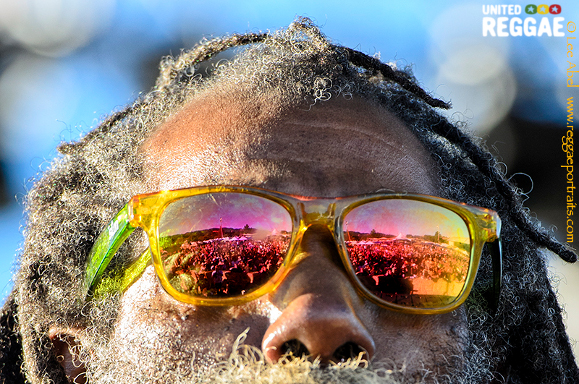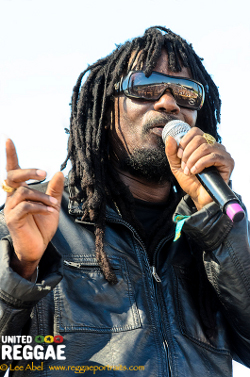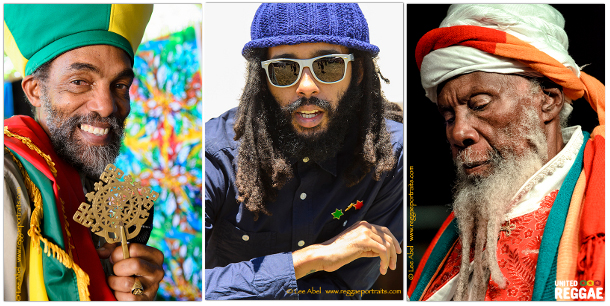Articles about reggae music, reviews, interviews, reports and more...
Sierra Nevada World Music Festival 2013

Sierra Nevada World Music Festival 2013
Sierra Nevada World Music Festival Celebrates 20 Years, Boonville, California, and June 22-24
For 20 years, producers Warren Smith of Epiphany Artists and his partner Gretchen Franz have presented one of the finest world music festivals in the U.S.
Having hosted hundreds of superstars and rising stars at three different venues over the years, there was much speculation on how they would celebrate their 20th anniversary at Mendocino County Fairgrounds in rural Boonville, CA.

No, there were no explosions of fireworks as Rihanna popped out of a giant cake.
The 20th Annual Sierra Nevada World Music festival kept it simple yet exciting with the royal family of reggae (Stephen, Damian and Julian Marley and the Ghetto Youths Crew), the reigning princess of Afrobeat, (Fatoumata Diawara), the daughter of a Sex Pistol (Hollie Cook), one of the most popular American reggae bands, (SOJA) and as scores of fabulous vintage artists, children’s performers and upcoming artists.
SNWMF 20 kicked off on the first day of summer, June 21, and ended on the night of a full moon, June 24. Featured on the main (Valley) stage on opening night was a "regatta de blanc" (a pseudo French translation of “white reggae” coined by the police on their 1979 album) showcase. The set featured The Green, a dub-heavy band from Hawaii, the jazz infused Groundation, from Sonoma County, CA and the politically charged SOJA, from the Washington, D.C.
On the same night, roots and culture fans gravitated to the smaller (Village) stage across the fairgrounds where veteran SNWMF performers and legends such as Ras Michael and Sister Carol and Mystic Roots performed.
In the SNWMF Press Tent, I caught up with key members of SOJA—Jacob Hemphill (lead singer/songwriter, guitarist) and Patrick O'Shea (keyboards). Their original name “Soldiers of Jah Army” was inspired by Peter Tosh. Hemphill and O’Shea listed the band’s collective influences as Bob Marley, Studio One, Fattis Burrell, Lucky Dube and King Yellowman.
“We went from playing clubs to now playing stadiums and a lot of places,” said Hemphill. “Ticket sales are crazy. It’s something that we never expected. We went to Australia for the first time, New Zealand, New Caledonia and all over the South America and United States.
We’re about to head to Europe. We’re having a great time. This is our 13th year doing it.”
I asked the members how growing up in Washington, D.C., the nation’s capital, shaped their musical perspective.
“I love it,” said Hemphill. “I think it kind of formulated what our band is about. A lot of American reggae bands have kind of an American reggae take on stuff, but our band reminds me a lot of how reggae music was in the sixties and seventies in Jamaica—very political, very much about the world, about the people who live in the world. When Bob Marley and Peter Tosh and Inner Circle were doing reggae, they were speaking about themselves. They were like a newspaper, you know; they would let you know how they dealt with things politically and spiritually, and they would let you know how the human race should be. If you look at other kinds of music, you why Stevie Wonder and Sting gravitated towards reggae; because it was fresh; it was edgy. Bob Marley was the biggest fish in the smallest pond ever, so when he passed, people were copying him, or copying whoever was popular at the time. Reggae nowadays is just recycled messages from 40 years ago. I think Soja is talking about things (foundation reggae artists) used to talk about and trying to change the world. I hope that’s the reason that we are popular. In places where people struggling, reggae is more popular; and in places where people are doing fine, reggae is a more recreational music. Reggae is a tool that people use for revolution.”
O’Shea said that he is most looking forward to performing on the African continent; since he grew up in Monrovia, Liberia.
“(South African reggae artist) Lucky Dube was murdered for the money in his pocket,” said O’Shea. “They are going to have to figure out their own situation before they bring a bunch of white guys from D.C. in, but we would love to play in Africa, as well as Asia and Ireland.”
 Indeed, it was a rare treat to hear the veteran reggae star Cornel Campbell, aka Don Gorgon perform his lover’s rock hit “100lb of Collie” on a dusty Saturday afternoon.
Indeed, it was a rare treat to hear the veteran reggae star Cornel Campbell, aka Don Gorgon perform his lover’s rock hit “100lb of Collie” on a dusty Saturday afternoon.
Perhaps the biggest surprises on the second day of the festival were Luciano and the iKronik band filling in for the ailing U-Roy, and SNWMF favorite, smooth operator Don Carlos subbing for Max Romeo, who could not make it due to immigration issues. Even at short notice, Luciano, the velvet baritone from the Hills of Manchester, JA, gave his all. As a tribute to U-Roy, Luciano perfectly emulated the veteran toaster’s trademark style. Drawing on his roots in the Christian church, Luciano concluded his set with a gospel-inspired mash up of his Rasta anthem “Lord Give Me Strength,” “When the Saints Go Marching In,” and “Old Time Religion.” Ironically, Luciano was the Sunday night’s headliner at SNWMF 2012.
As former I-Three Marcia Griffiths taught the audience how to do the “Electric Boogie,” aka the Electric Slide dance, the Marley family, who arrived in a caravan of three tour busses, geared up for Saturday’s headlining performance. Mobbed by fans, Grammy winning artists Stephen and Damian Marley and their brother, Julian Marley, signed autographs, and posed for photos before the show under the strict watch of security. Their show was an all-star Rasta-funky revue featuring guest artists, singer Chris Ellis (son of the late Alton Ellis), deejaySpragga Benz, co-star of the movie “Shottas,” soaring soprano Rovleta Fraser and a breaking artist, Stephen’s son Joe Mersa Marley. It was a ballistic, upbeat show including tracks such as “Confrontation,” “Skillex,” “Set Up Shop,” “Hey Girl,” “Beautiful,” “Love & Unity” Bob Marley’s “Could You Be Loved,” and Damian “Jr. Gong” Marley’s wildly popular “Road to Zion” and “Welcome to Jamrock,” based on Ini Kamoze’s pulsating “World a Music” riddim. The Marley Magic was definitely in the air as the group was joined by several of Bob Marley’s grandchildren, who sang, danced and waved flags.
Every year at SNWMF, I indulge in a guilty pleasure-- wrapping my lips around a luscious, hand dipped ice cream bar from the Frozen Fantasies booth. While browsing the food court, between shows, I discovered a booth run by none other than Dr. Dread, aka Gary Himelfarb, former owner of the Washington D.C. based Ras Records. For years, Dr. Dread fed our souls as the producer and distributor of conscious reggae music; now he has translated the same passion to creating food. Dr. Dread has combined America’s favorite snack, the potato chip, with his secret jerk seasoning. A potato chip gone irie, mon!

In this writer’s opinion, Mali’s rising star, singer/songwriter Fatoumata Diawara was the most fascinating artist to perform on Sunday, June 24th. Diawara and her three piece band took us on a mystical journey through the African Diaspora. On her first U.S. tour, Diawara gained rave reviews this summer performing at smaller California venues such as Yoshi’s San Francisco and the Napa Valley Opera House. A modern griot who sings for peace and empowerment of women, Diawara is also a master of the electric guitar. When she dances, it’s as if a spirit overtakes her as she whirls and twirls like a dervish. Diawara described her dancing as a combination of African styles.
“We don’t have enough African women who sing, so I cannot represent only Mali; I’m trying to represent all of Africa by dancing,” said Diawara. “Sometimes, I take you to Cameroon from Mali. This is my first tour in America, and I’m really excited to meet more American audiences. It’s like we are in school. We have been on tour for three years now in Europe.”
Diawara, who currently lives in Paris, sings in French and her native language, Bambara. Her elegant dresses, adorned with mirrors and cowrie shells are also original creations from Mali. I asked Diawara what advice she would give to upcoming female artists from Africa.
“It’s necessary to keep this tradition safe,” said Diawara. “It’s good to do not only commercial music from Africa; that’s why I decided to follow great female artists like Miriam Makeba and Angelique Kidjo. The story has to continue. Someone has to represent African women and how powerful we are. It’s important to share our culture, because our culture is so interesting.”
The African showcase on the Valley stage continued with guitarist Bombino, from Algeria; and the night’s headliners, Alpha Blondy (Cote d’Ivoire) and the Solar System band. Often referred to as the Bob Marley of Africa, Alpha Blondy closed the show with some of the songs that propelled him to worldwide stardom in the nineties, including “Jerusalem,” and “Cocody Rock.”
One of the my personal highlights of SNWMF was running into Studio One legend Leroy Sibbles in the parking lot on his mad dash to get to the airport. Sibbles' set included reggae classics such as “Party Time,” “Sea of Love,” and “Equal Rights.” Sibbles said that he last performed at SNWMF two years ago. I asked him how it felt to be back for their 20th anniversary.
“I’m really pleased, I’m honored to be here; and I’m glad,” said Sibbles. “I enjoyed myself, I met the band for the first time, and we did our thing. I love what I do; I put everything into it-my pain and my passion.”
Read more about this topic
Read comments (1)
| Posted by SCCRobert on 08.23.2013 | |
| I would have to agree that this festival is one of the best if not the best and Don Carlos tore the roof of this place this year and he wasn't even scheduled on the bill. Big Ups SNWMF!!! | |
Comments actually desactivated due to too much spams
Browse by categories
Recommended Articles
Latest articles
Recently addedView all
© 2007-2026 United Reggae. All Rights Reserved. Reproduction in whole or in part is prohibited. Read about copyright
Terms of use | About us | Contact us | Authors | Newsletter | A-Z


































































